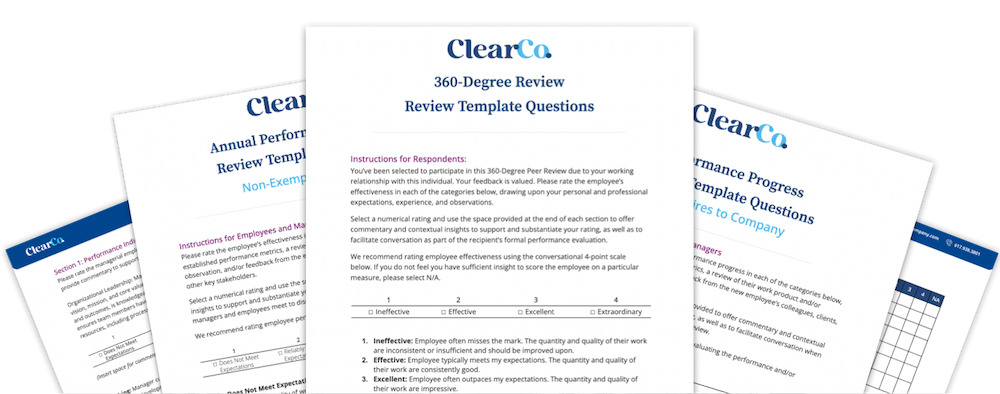This post was originally published in July 2020. It was updated with new information and statistics in January 2023.
Many organizations are realizing their performance management approaches are no longer suitable for the new workforce dynamic. Just 26% of employees strongly agree that their performance reviews are fair, according to Gallup research. That’s a sign that performance management in 2023 needs to be different in order to be effective. Companies will need to become even more agile in order to meet current and future performance management needs.
#PerformanceManagement in 2023 is simplified, agile, and works for your remote employees, too. Find out more in @ClearCompany’s latest post:Many of the trends we see in performance management align with larger patterns in the workforce ecosystem. If your company doesn’t keep those patterns in mind when building a performance management framework, the process may not be as effective as it could be.
- Performance management systems that have a positive impact on both employee and business performance are much more likely than others to report better business outcomes.
- Companies with effective performance management programs are 1.5x as likely to outperform their competitors and 1.25x more likely to report higher employee productivity.
The Need To Simplify The Performance Management Process
When organizations strive to simplify their performance management processes, the increase in efficiency allows for a performance review that is more focused on the individual. This streamlining provides the reviewer with ample time to get to know and understand the employee’s professional and personal challenges as related to their work, and reviewers can approach the conversation with empathy. Here are some quick tips for simplifying your performance management process:
- Adopt a shorter timeframe for review cycles. Rather than a typical mid-year and year-end review, implement performance reviews more consistently. This allows for more specific feedback and allows employees to make adjustments in real time.
- Adjust your 360-Degree performance reviews to fit a smaller pool. Peer feedback is integral for professional growth, however, gathering feedback from every employee about their colleagues can take too much time. By limiting peer feedback to one to three employees (i.e., employees within the same department or employees eligible for promotions), you can continue to get insights from your team without additional time constraints.
Now is the perfect time to implement performance reviews. By listening to their employees’ concerns and offering support and feedback, managers can reinforce their commitment to their teams’ well-being and professional development. Effective performance management is linked to better business outcomes; companies that are able to pivot their processes as the needs of the workforce change will rise to the top.
Continuous feedback isn’t a novel idea — companies around the globe have been utilizing this strategy for years. Check out some of the improvements organizations notice after transitioning from the standard performance review to a continuous feedback method:
- HR professionals using ongoing feedback are 50% more satisfied with their performance management process.
- Employees are 4x more likely to be engaged if they’ve received “meaningful feedback” in the past week.
- 83% of employees want more feedback — no matter if it’s positive or negative.
- A focus on employee growth and development
- The separation of performance from compensation
- Feedback from peers and stakeholders in addition to managers
By integrating these elements into your employee review process, you can take a more holistic approach to performance management.
The Need to Manage a Permanently Remote Workforce
The way businesses operate has changed over the last few years, and employees’ needs have also changed. Companies are challenged with addressing individual needs more than ever before as remote and hybrid workplaces become commonplace. And as organizations change, the way employee performance is managed must change with it.
Have you adapted your #PerformanceManagement processes to fit the current environment? @ClearCompany explains why the old methods are not as #effective and how to update them:Performance reviews allow managers to have an honest and open conversation with their employees about their needs. Ask your employees questions about how they are handling working virtually and whether they have the tools they need to do their job successfully. It’s likely they have different needs now than at the start of the pandemic or even at the start of last year.
Managing a remote team can be a struggle, but there are many resources managers can rely on for advice. Here are some of the most important questions to consider when managing your virtual or hybrid team:
- Have you been consistently recognizing employees who are performing well?
- Are your goals and objectives clear?
- Are you offering adequate outlets for communication?
- Are you using your coaching skills to improve employee performance rather than just delegating tasks?
By combining feedback from employees with self-reflection, managers will see a clearer path to transforming their current processes.
An Agile Approach To Performance Management
As we continue to navigate changes in the workplace and employees’ priorities, the need to take on agile performance management rises. This is because agile performance management is a more continuous process than traditional performance management. An agile framework provides organizations with an option for both the stability of traditional performance management and the dynamism of an agile process.
The key is continued authenticity and engagement in two-way communication. With consistent and clear communication on goals, challenges and successes, the performance review process will ultimately be organic, and nearly effortless, for all involved. It becomes almost a reference document of discussions and work that has been taking place throughout the review period.
- Bernadette Robertson, GLIDE Foundation via Forbes
Agile organizations focus on transparency in goal setting and employee appraisals, and the frequency of feedback in an agile process allows for a more defined glimpse of employee productivity. Tracking the progress and performance of remote employees can be more challenging, so managers need to be certain they are utilizing the correct tools. Through performance management software, such as ClearCompany’s comprehensive platform, leaders can measure performance, track goals, and gain insights from analytics.
Implementing an agile performance management process in your organization will help you navigate the changing times and increase your overall performance:
- Gallup recommends coaching employees at least once a week, which means providing recognition, constructive feedback, or encouragement and support.
- 71% of companies with an effective performance management process said their managers are trained on how to provide feedback and coaching.
- Employees who receive daily feedback are 3.6x more likely to say they are motivated to do great work.
When comparing traditional performance review methods to continuous feedback methods, a large majority of employees prefer the latter. Ditch the annual feedback and transition into a more agile process.
Transforming Hyper-Connectivity Into Hyper-Productivity
Employees are working in an ultra-connected world and the tools and technologies being used at work for better collaboration can either make or break performance. Effective performance management ensures hyper-connected employees are also incredibly productive and that technology is enabling productivity, not hindering it. The technology should also provide real results in terms of improving performance.
Here are a few things to look for in performance management technology:
- One-on-one meeting tools to help managers set performance expectations and support employees with frequent, timely feedback
- Performance review templates to help you create annual reviews, mid-year reviews, and other performance appraisals
- Tools for setting goals that align with business goals and tracking their progress
The pressing need to completely revamp performance management and realign it with how we work today is apparent. An effective performance management system must consider every segment in your workforce, take on an agile approach, and be built to withstand the noise in employees' lives.
With ClearCompany, performance management is more easily managed —even from a distance. If you’re looking to track and measure employee performance more efficiently in 2023, ClearCompany can help.
Reach out to our experts today to learn more about how our software can help you achieve organizational alignment and growth.



